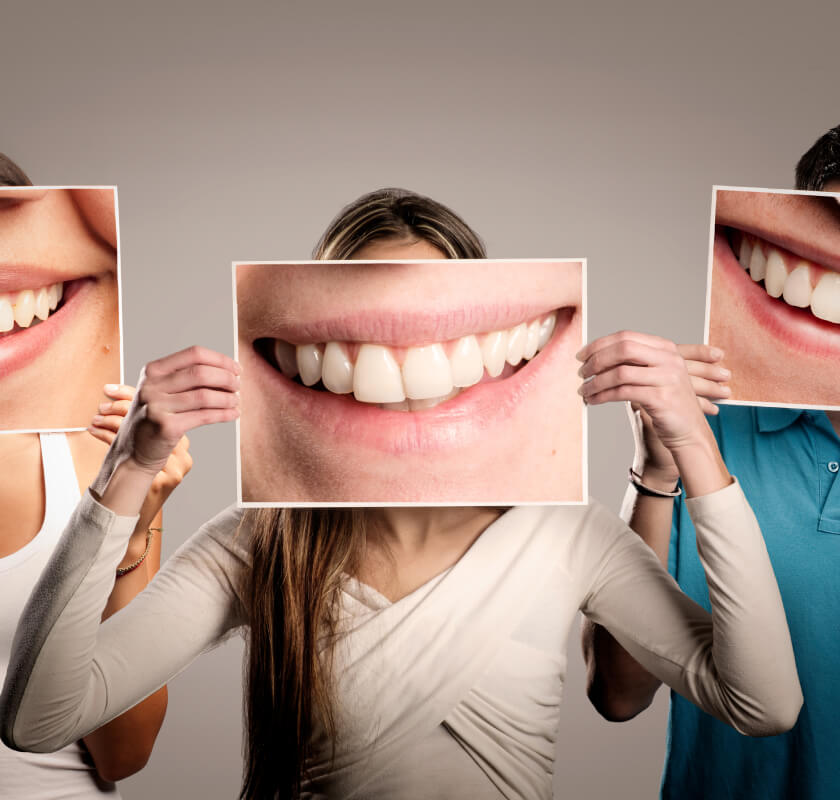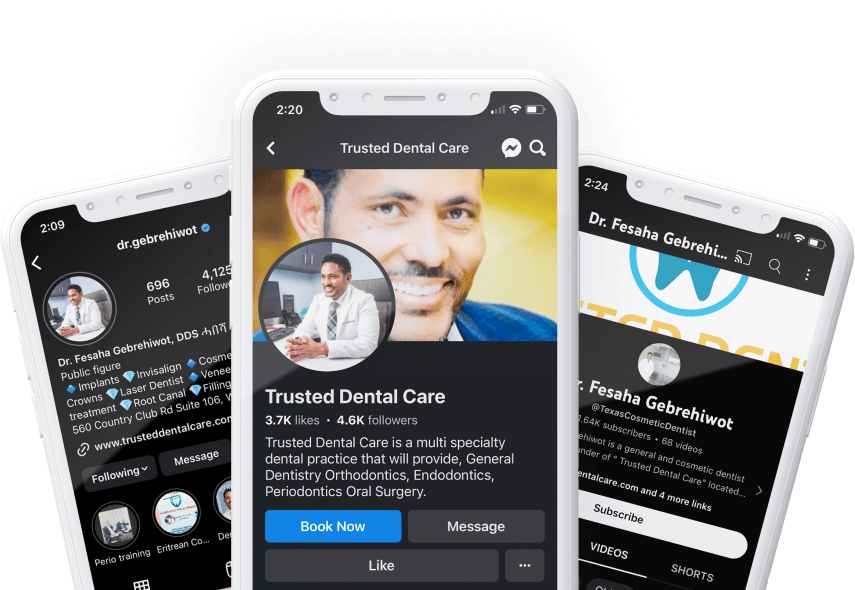Essential Preventive Dental Care Practice Tips from Our Wylie Dentist
Preventive dental care is your secret weapon against plaque buildup and decay, stopping problems before they even start. For our Wylie, TX, neighbors, we know that juggling family life and dental worries can make sticking to a routine tough. But don’t worry! Simple daily habits, combined with professional care, deliver amazing results. At Trusted Dental Care, our comprehensive general dentistry services and patient-first approach are here to help you put these tips into action and book those all-important appointments.
If you’re looking for a new general dentist in Wylie, choose Dr. G! Contact our dental office near you today at (214) 702-0446. We welcome new patients.
What Are the Best Oral Hygiene Practices for Preventive Dental Care?
Your daily oral hygiene routine—brushing, flossing, using mouthwash, and cleaning your tongue—is the bedrock of a healthy mouth. These practices sweep away plaque, keep bacteria in check, and maintain healthy gums and teeth. Consistently removing debris protects your enamel from erosion and prevents gum inflammation, significantly lowering your risk of cavities and gum disease. Think of it as a multi-layered defense: mechanical cleaning combined with antimicrobial rinses creates a powerful shield for lasting oral health and a smile you’ll love to show off.
How Should I Brush My Teeth for Optimal Oral Health?
To brush effectively, use a soft-bristle toothbrush angled at 45 degrees toward your gum line. Perform gentle, circular motions for a full two minutes, twice a day. This technique lifts plaque from tooth surfaces and along the gum line without harming your enamel or soft tissues. Brushing after meals is also a great habit to help neutralize acids and reinforce your daily preventive care efforts.
What Are Effective Flossing Techniques to Prevent Cavities?
Flossing daily is crucial for removing plaque from between your teeth, those tricky spots brushing can’t reach, and is key to preventing cavities. Gently slide a fresh section of floss between each tooth. Curve it into a “C” shape against the side of the tooth and move it up and down to clear away any lingering plaque. If your teeth are close together, floss picks or interdental brushes can make it easier to reach and ensure thorough plaque removal.
How Does Mouthwash Support a Healthier Smile?
Antimicrobial mouthwashes are fantastic for reducing the overall bacterial count in your mouth and freshening your breath by tackling plaque in those hard-to-reach areas. Using a fluoride rinse once a day adds an extra layer of protection, strengthening your enamel and making it more resistant to decay. Rinsing after flossing can help distribute beneficial ingredients even further into those tight spaces, boosting your preventive benefits.
Why Is Tongue Cleaning Important for Oral Hygiene?
Cleaning your tongue helps remove bacteria and the compounds that cause bad breath, as well as those that can contribute to acid production on your teeth. Using a tongue scraper or a soft brush to gently sweep across the surface of your tongue reduces the reservoir of bacteria in your mouth. Adding tongue cleaning to your routine enhances your overall plaque control and boosts your confidence in fresh breath, complementing your existing hygiene practices.

How Often Should You Schedule Regular Dental Checkups and Teeth Cleanings at Trusted Dental Care?
Regular dental checkups and professional teeth cleanings from our Wylie dentist are essential for a thorough examination and deep plaque removal. They help us catch any developing issues early and keep your oral health in top shape. Aiming for visits every six months allows our dentist to spot early signs of cavities, gingivitis, or enamel wear, and provides a perfect opportunity to get personalized advice on your home care. This consistent schedule helps prevent major problems and keeps your preventive strategy on track.
Are you ready to schedule a new patient appointment? Contact the best dentist near you today at(214) 702-0446.
What Happens During a Professional Dental Checkup?
During your checkup, Dr. G will carefully examine your teeth, gums, and the soft tissues in your mouth for any signs of decay, inflammation, or oral cancer, using visual checks and tools like X-rays. He’ll also assess your bite and the condition of any existing dental work to ensure everything is functioning correctly. This thorough evaluation is the foundation for creating personalized preventive strategies and intervening early if needed.
How Do Teeth Cleanings Prevent Cavities and Gum Disease?
Professional teeth cleanings, also known as prophylaxis, involve scaling to remove hardened tartar and polishing to smooth out surface stains and any remaining plaque. By meticulously cleaning away bacterial deposits both above and below the gum line, these cleanings effectively halt the progression of gingivitis and reduce the frequency of acid attacks on your enamel. Most patients notice smoother teeth and less gum sensitivity right after their cleaning.
What Are the Recommended Dental Checkup Frequencies for Different Age Groups?
As we move through different stages of life, our oral health needs and risk factors change, making it important to adjust dental visit frequency accordingly.
| Age Group | Recommended Visits | Rationale |
| Children (6–12) | Every 6 months | Supports healthy tooth development, monitors hygiene habits |
| Teenagers (13–19) | Every 6 months | Addresses orthodontic needs and hormonal changes |
| Adults (20–64) | Every 6 months | Maintains routine preventive care, early detection of issues |
| Seniors (65+) | Every 3–6 months | Manages receding gums, root exposure, and systemic health links |
How Do Fluoride Treatments Strengthen Teeth and Prevent Decay?
Fluoride treatments infuse your enamel with concentrated minerals, making it more resilient to acid attacks and helping to repair early signs of decay. Professional treatments, like varnishes or gels, deliver a high concentration of fluoride directly to your teeth, creating a protective shield that lasts for weeks. This professional boost complements your daily use of fluoride toothpaste, significantly enhancing cavity prevention.
What Role Do Dental Sealants Play in Cavity Prevention?
Dental sealants are thin, protective coatings applied to the chewing surfaces of your back teeth, effectively sealing off the deep grooves where plaque and food particles tend to hide. By creating a smooth barrier, sealants prevent food and bacteria from getting trapped in these vulnerable areas. This preventive dental treatment is particularly beneficial for children and teens who are at a higher risk for decay on their molars and premolars.
How Can You Recognize Early Signs of Gum Disease?
Early signs of gum disease often include gums that appear red, swollen, or bleed easily during brushing or flossing. Persistent bad breath and a slight receding of the gum line can also signal inflammation. Recognizing these symptoms is key to seeking prompt professional evaluation, which can prevent the condition from progressing to more serious periodontitis and help maintain long-term gum health.
How Often to Schedule Checkups & Cleanings at Trusted Dental Care
Embracing healthy habits—like cutting back on sugary snacks, avoiding tobacco, ensuring adequate saliva flow, and managing stress—significantly reduces the proliferation of harmful oral bacteria and the acid attacks on your enamel. Brushing after meals, chewing sugar-free gum, and quitting smoking all contribute to a balanced oral environment. These lifestyle choices work hand-in-hand with professional preventive services and your daily hygiene routine.
| Cavity Preventive Strategy | Primary Mechanism | Core Benefit |
| Fluoride Treatment | Enamel remineralization | Increased acid resistance |
| Dental Sealants | Physical pit-fissure barrier | Occlusal decay prevention |
| Healthy Lifestyle Choices | Reduced sugar and tobacco use | Lower bacterial growth and inflammation |
We offer comprehensive preventive dental care at our dental office in Wylie, TX. Schedule your appointment with our general dentist today at(214) 702-0446.

How Does Diet and Nutrition Impact Your Oral Health and Smile?
What you eat and drink has a direct impact on your mouth’s pH balance, the quality of your saliva, and the types of bacteria present, all of which affect the strength of your teeth and the health of your gums. Nutrients like calcium and vitamin D are essential for building strong enamel, while excessive sugar and acid can accelerate demineralization.
Which Foods Promote Strong Teeth and Healthy Gums?
Foods rich in calcium, such as dairy products, leafy greens, and almonds, provide the minerals needed to fortify your enamel. Crunchy fruits and vegetables like apples and carrots not only stimulate saliva production but also help clean your teeth naturally. Foods high in vitamin C, like citrus fruits and bell peppers, are vital for producing collagen, which keeps your gum tissues healthy. Regularly including these nutrient-packed foods in your diet reinforces your preventive dental care efforts.
What Foods and Drinks Should You Avoid to Prevent Tooth Damage?
Frequently consuming acidic beverages (like citrus juices and sodas) and sticky sweets (such as caramels and gummies) exposes your enamel to prolonged acid attacks and allows sugars to linger on your teeth. This can lead to demineralization and accelerate cavity formation. Limiting these items and choosing water or sugar-free alternatives significantly reduces your risk of decay and complements your regular hygiene routine.
How Does Hydration Affect Oral Hygiene and Cavity Prevention?
Staying well-hydrated is key to maintaining good saliva production. Saliva acts as a natural defense by neutralizing acids, supplying minerals to help remineralize teeth, and washing away food particles. Drinking water, especially after meals, helps restore your mouth’s pH balance and prevents dry mouth, a condition that can encourage bacterial growth. Prioritizing water intake supports saliva’s natural protective functions and bolsters your daily preventive habits.
Do Smoking and Alcohol Have an Impact on Oral Health?
Using tobacco products reduces blood flow to your gums, hindering tissue repair and making you more susceptible to gum infections. Alcoholic beverages can dry out your mouth and increase acidity, weakening enamel and creating an environment where bacteria can thrive. Cutting back on or quitting these substances significantly improves your gums’ ability to heal and helps preserve your enamel, making your preventive care more effective.
What Special Preventive Care Is Recommended for Children’s Dental Health?
Preventive dental care for children focuses on establishing good habits early on, monitoring their tooth development, and protecting their delicate enamel with professional treatments. Setting up consistent home routines and scheduling regular dental visits creates a strong foundation for a lifetime of healthy smiles and positive dental experiences.
When Should Children Have Their First Dental Visit?
It’s recommended that children have their first dental visit by their first birthday or within six months of their first tooth appearing. This early visit allows us to check their development and provide parents with guidance on proper care techniques. Early visits help children become comfortable in a dental setting, easing any potential anxiety and ensuring any developmental concerns are identified promptly. Establishing this preventive relationship early encourages a positive outlook on oral health.
How Can Parents Support Effective Brushing and Flossing for Kids?
Parents can play a vital role by supervising brushing, using a pea-sized amount of fluoride toothpaste, and ensuring all tooth surfaces are cleaned with gentle, circular motions. Teaching children how to floss using child-friendly flossers or tape from an early age helps establish good interdental hygiene habits that can last a lifetime. Consistent parental involvement turns these essential tasks into familiar routines.
What Are the Benefits of Sealants and Fluoride Treatments for Children?
Applying sealants to newly erupted molars is a highly effective way to prevent decay in the deep grooves, significantly reducing cavity rates in school-aged children. Professional fluoride varnishes applied in our office strengthen developing enamel and can help with tooth sensitivity.
These preventive services work alongside home care by targeting the areas most prone to decay and supporting critical enamel maturation.

How Can Sedation Dentistry Help Manage Dental Anxiety During Preventive Visits?
Sedation dentistry uses safe and effective relaxation techniques to ease dental anxiety, making it possible for patients of all ages to receive preventive care comfortably. By helping to minimize fear and stress, sedation allows for thorough cleanings and accurate exams, fostering positive associations with dental visits and encouraging ongoing preventive habits.
We offer sedation dentistry in Wylie, TX. To learn more about our sedation options, contact our dental practice near you today at (214) 702-0446.
How Does Sedation Dentistry Improve Patient Comfort and Compliance?
By reducing the perception of time and alleviating fear, sedation dentistry promotes a state of relaxation and cooperation during cleanings and exams. Patients who might otherwise avoid dental care can more easily comply with recommended appointment schedules, leading to better preventive outcomes. This approach supports consistent oral hygiene maintenance and reduces the likelihood of needing emergency treatments down the road.
Why Choose Trusted Dental Care for Sedation and Preventive Services?
At Trusted Dental Care, we combine a warm, welcoming atmosphere with advanced sedation techniques to ensure every preventive visit is as gentle and stress-free as possible. Our personalized treatment plans and compassionate team are dedicated to addressing dental anxiety directly, empowering families to maintain their regular checkups and cleanings. Local families appreciate our convenient scheduling, comprehensive insurance acceptance, and our unwavering commitment to their lifelong oral health.
What Are the Long-Term Benefits of Consistent Preventive Dental Care?
Preventive measures catch decay and gum disease in their earliest stages, meaning you can avoid the need for expensive procedures like complex fillings, root canals, or extractions. Investing in routine cleanings and exams is a smart financial strategy that significantly reduces costs by preventing emergencies and extensive treatments. This cost-effective approach aligns perfectly with both your budget and your health goals.
What Is the Connection Between Oral Health and Overall Well-Being?
Your oral health plays a surprisingly significant role in your overall health. Inflammation in the gums, for instance, has been linked to serious systemic conditions like heart disease, can complicate diabetes management, and may even contribute to respiratory infections. Keeping your gums and teeth healthy helps lower systemic inflammation markers and supports a robust immune system. Strong oral health is a fundamental component of good general health.
Schedule Your Appointment at Our Wylie Dental Office
By consistently applying these preventive dental care tips, you’re ensuring your smile stays healthy, strong, and full of confidence. When you combine diligent home care with the professional preventive services at Trusted Dental Care, families in Wylie can look forward to a lifetime of excellent oral health and overall well-being.
Let’s get started! Contact our Wylie dentist near you today at (214) 702-0446.
